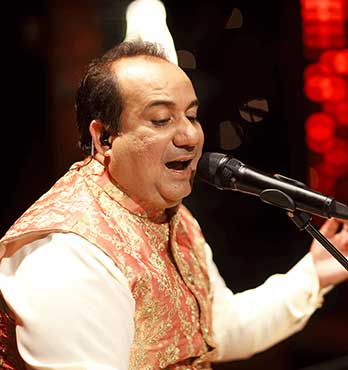Rahat Fateh Ali Khan

by Ayesha binte Rashid
When you meet Rahat Fateh Ali Khan, it’s hard to place him as the same person who creates such an intense energy on any stage that he occupies. Off-stage, he is gentle and genial, taking compliments with a polite smile, sharing jokes with the house band. But when he starts singing, there is no mistaking it: this is the voice that moves thousands of fans to tears, giving them the freedom to experience music with complete abandon.
Khan Sahab comes from a 600-year-old line of musical heritage in qawwali - his grandfather, Ustad Fateh Ali Khan, was a legend in the field and his uncle, Ustad Nusrat Fateh Ali Khan, is credited by many to have singlehandedly revived qawwali, bringing it into the mainstream and the international stage. Through this tradition, Khan Sahab was born with music in his veins. Since he was old enough to have gained awareness, he has been singing, skipping school to join his uncle for his daily morning riyaaz as a young child. Upon hearing his voice, Khan Sahab fondly remembers, his mother who thought she had sent him off to school, would discover the two mid-riyaaz.
“Paaji yeh ay school nahin gaaya? (Hasn’t he gone to school?),” she’d ask her cousin.
“Rehnde aaj. Aaj riyaaz karna ay. (Leave it. Let him do riyaaz today),” would be Ustad Nusrat’s reply.
From Antakshari to Cricket, everything related back to music for Khan Sahab. “While playing cricket, I’d be practicing anything that [my uncle] had taught me.” This was more than mere practice for Khab Sahab, it became a connection to his soul and he often found himself moved to tears by music, especially while listening to his grandfather’s performances.
“What would a 7-year-old kid understand in a qalaam written by Jami or Rumi in Persian?” he now asks in retrospect. Whatever it may have been, Khan Sahab felt it.
Chosen by Ustad Nusrat as his heir, Khan Sahab took the helm of his family’s qawwali legacy and has since then gone on to sing thousands of songs, at home and abroad. His musical repertoire has expanded to include contemporary styles of music. But, always, he aims to share the gift that music has given him with the world.
“Music has given me respite. It’s kept my soul alive. If music has given me peace, what more can I ask of it?”
He carries this music inside him, wherever he goes, and so, he finds it wherever he goes. “Where there is sound, continuous and humming, then sur has been established. Whether you acknowledge it or not, melody and tempo exist – the world’s tempo, the galaxy’s tempo, the universe’s tempo.” And as for our music, man-made music: “As long as the spirit exists, music will exist,” he states. Music, Khan Sahab explains firmly, is here to stay.
